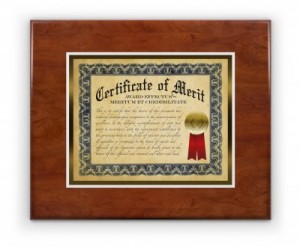While I never try to belittle the importance of being yourself and bringing your intangibles to the table every day in your engineering career-development efforts,there are certain accomplishments or accolades that are a must in order for you to succeed in achieving your goals in your engineering career—and credentials are among them. By credentials, I mean licenses, certifications, awards, education, publications, etc.
We have discussed this topic a lot recently in the Institute for Engineering Career Development forums, and I thought it warranted a full post here. There are unique skills and talents that you must develop to be considered among the best at what you do, such as your ability to connect with people, present information, be responsive, and stay productive; however, oftentimes in addition to all of the above, there are certain credentials which your goals will not be possible without. For example, let’s say you want to achieve partner in an engineering company, and the company requires a master’s-level degree and/or a professional engineering license; well, no matter how great you are at business development, you will have to gain one of those credentials to achieve your goal. While all of your skills and business accomplishments can walk you through that door to partner, having those credentials is the key that must first unlock the door before you can walk (or run) through it. No matter how fast you are going in your career, without that key, you will run into a locked door, every time.
I have taken six exams in my engineering career (FE, PE, LEED AP, ACC, CPSWQ, and CPSEC) and passed them all on the first try, thanks to planning and preparation, not brain power. Each of these six credentials served a purpose in helping me advance my engineering career, in addition of course to bolstering my knowledge and reputation in these fields. The FE helped me get my first engineering job, the PE and LEED AP helped me get promoted, and the water quality and erosion control certifications gave me increased credibility with my peers and clients. My master’s in civil engineering also helped me, mainly by adding an Ivy League school to my resume, which has opened many doors for me.
Based on my experience with credentialing, here are some recommendations for deciding on whether or not to pursue a credential, and then for obtaining one.
- Lean on your goals when deciding whether or not to pursue a certain credential. If you don’t have goals, set some immediately. I highly recommend that, as an engineer, you pursue the license or similar certification in your country (i.e., the Professional Engineering license in the United States). Don’t pursue credentials just because people tell you to; pursue them if they will help you achieve your goals. This is important, as every day there are new credentials being created, and you can spend a lot of time trying to collect ones that will have no impact in your engineering career-development efforts.
- Obtain the credentials you will need to achieve your goals as early on in your engineering career as possible. Like anything else, the more you do it, the busier you become. As you advance your engineering career, you will undoubtedly take on more tasks and responsibilities, both professionally and personally (i.e., a family); therefore, you should seek out the right credentials as soon as possible.
- When you decide to pursue a credential, the first two things you should do are sign up for the exam and tell your supervisor when you are taking it. Taking these two steps will immediately commit you mentally to preparing for the exam. They should provide you with the motivation to successfully prepare for the exam. Part of this process will be to look at the exam application as early as possible to ensure you have what it takes to get accepted to sit for the exam.
- Take a review course for the exam. Regardless of how good you are at exam taking, your time is too valuable to study for an exam and not pass it. Take a review course for every exam you take. The review course, if nothing else, will keep you focused in your studying efforts when all of your work deadlines and personal responsibilities try to pull you away.
- Seek financial assistance from your engineering company. Many companies will reimburse engineering professionals for costs associated with the exam, including exam fees, review courses, books, etc.
- If you do not pass a credentialing exam, sign up for the next sitting for that exam. This is critical, as I have seen many engineers fail the FE exam only to take some time off before taking it again, and this approach usually results in a long delay in obtaining the credential—if it is obtained at all. Avoid this costly mistake and keep pushing forward until you reach your goal.
While I know that there is a lot more to a successful engineering career than the letters after your name, those letters often act as keys to open doors of opportunity that your unique talents can then carry you through.
This month in the IECD, we are holding a webinar which will feature several experts on the topic to discuss credentials and help members decide which credentials are best for them in their engineering careers. We will also touch on the Project Management Professional (PMP) and how it may be helpful to engineers. Please consider joining us for the call. Even if you register after the call is held, you will receive the recording.
To your success,
Anthony Fasano, PE, LEED AP
Engineering Management Institute
Author of Engineer Your Own Success




